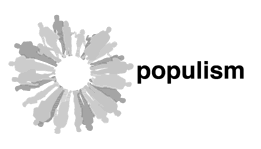Counting the vote in Vilnius
by Simon Rees
The figure frozen on the face of Superflex and Jens Haaning’s exhibition counter Number of Visitors 2005 mounted on the façade of the Contemporary Art Centre read 8749. It seemed a decent enough exhibition attendance as the fork-hoist lowered the work from its mount. If it had been able to count the people who attended the vernissage, the opening of Lithuanian artist Audrius Novickas project (that launched a day earlier), The Smiths Karaoke party for Phil Collins work, the CAC Café Talks by Dieter Lesage, Niels Werber and Vanessa Müller, and the closing party with US/Berlin deejay Donna Summer it would have been even higher.
And even higher still if there had been a way of adding the number of people who were involved in the major Lithuanian project by Gediminas and Nomeda Urbonas Pro-test Lab that took the form of a sit-in/protest laboratory at Vilnius’s ‘Lietuva Cinema’ in an attempt to save it from demolition at the hands of private property developers: who currently hold an oligarchic power over the political process and the future-scape of the city. The outcome of the action is as yet unknown. I certainly hope the protest has a positive result. There were certainly hundreds of students/architects/designers/musicians/concerned citizens of all ages visiting and engaging with the space whenever I walked past on my way home from work.*
Let’s set the number for-argument’s-sake at 11,000. Well-done Jens & Superflex!
In terms of media I will be an institutional egoist and mention the launch of the CAC’s new magazine INTERVIU that coincided with the opening of Populism and promoted the exhibition. The second issue that we launched at Venice contains an interview between Lars Bang Larsen and the collective “Henry VIII’s Wives”. Look out for the magazine in the coming weeks at our institutional partners including Frankfurter Kunstverein. The CAC also made a special episode of our weekly arts television program CACTV that airs on commercial Channel One on the topic of the Populism exhibition. (This writer also did his bit writing on the exhibition for magazines in Lithuania and New York, and one of the Lithuanian newspapers). Naturally, CAC also paid (and has a sponsors deal) for regular poster drops and billboard spots so Populism the exhibition popped-up in random form around Vilnius.
Generally speaking all of the major Lithuanian media organisations followed-suit with reportage in the major daily newspapers, on cultural television, and in the cultural supplements and journals. The reportage was resolutely positive. Of particular note to the commentators was the broad mix of media (the CAC is often criticised at home for shying away from painting). No wonder the audience came in droves.
From the audience perspective the posters available as take-away souvenirs produced by a number of artists proved extremely popular. The stacks of posters by Norwegian collaborators Gardar Eide Einarsson and Matias Faldbakken, and Minerva Cuevas disappeared in record time. Scraps of the horror film graphic posters by Einarsson and Faldbakken are still clinging to the hoardings around the major building site next door to the CAC: a ghostly reminder of the exhibition and proof that so that the spirit of street of the halls can in some small way infect the body of the city at large. To a casual street viewer they must look like a new popular disease.
The point of the exhibition, however, was a cure: and it did manage to cure a general sense of apathy towards debate surrounding contemporary art here in Vilnius. The CAC café talks on the topic of Populism were attended by vocal audiences who debated aspects of the discourse at the conclusion of the lectures. The resulting line of enquiry carried over into various discussions I eavesdropped (within the Lithuanian contingent) at the Venice Biennale. Their opposing opinions were honed by clear concepts of what good and bad populism mean; in relation to the presentation and reception of large-scale exhibitions.
*Since this article was written the Lietuva Cinema was closed for business on Sunday 25 September. Urbonas staged a closing-party rave on the evening of Saturday 24 that was attended by hundreds of people. The final screening programme on Sunday 25, to match the ‘mad’ situation, was of Lars von Trier’s The Idiots and Milos Forman’s One Flew Over the Cuckoo’s Nest with lectures by the local cinema community and a curator from the Rotterdam Film Festival. The fate of the building remains unknown.
|



